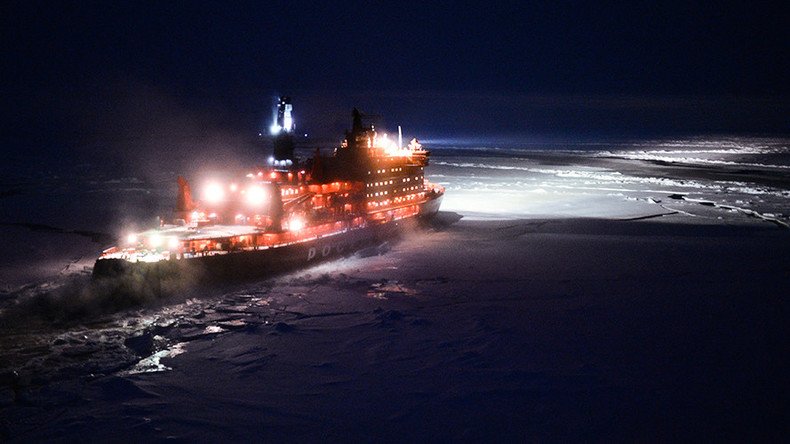Russia eyes military icebreaker force to protect Arctic borders - report

The Russian Navy is reportedly considering the creation of a force of military icebreakers and ice-class attack ships based on the newest nuclear icebreakers. Their task would be security of the Northern Sea Route and protecting Russia’s Arctic borders.
The design of an ice-class attack vessel is being discussed with the military, Valery Polovinkin, adviser to the Krilov State Research Center, specializing in research into sophisticated maritime equipment, told Izvestia daily. It is likely that the ship will have a lot in common with the Leader project, a new-generation of Russian nuclear-powered super-icebreakers expected to enter the design phase in 2016.
Russian military plans mobile nuclear energy plants in Arctic by 2020 https://t.co/2VlqyRY0FIpic.twitter.com/VKSueuyYEW
— RT (@RT_com) November 5, 2015
The CEO and chief constructor at the Center’s subsidiary developing Leader project, Aleksandr Ryzhkov, believes the new 205-meter-long super-icebreaker, powered by two 60 MWt RITM-400 next-generation nuclear reactors will have excessive power “to cross the North Pole in any direction, any time of the year, in any ice condition [thickness].”
The icebreaker’s power plant will have unprecedented operating capacity of crashing through 2-meter-thick ice at a speed of 14 knots, which is seven times faster than the nuclear icebreakers operating today.
“At a slower speed it will go through ice 4.5 meters thick,” Ryzhkov told Izvestia. “For navigating vessels on the traditional routes along the shore this is excessive.”
#Russia launches world's biggest, most powerful nuclear #icebreaker#Arktika#VIRALhttps://t.co/smBxUBi4txpic.twitter.com/JvdiEmWo60
— RT (@RT_com) June 17, 2016
Although the Leader project is being designed for civilian use, “these days, this sector of shipbuilding is increasingly becoming a locomotive for the military taking relevant decisions,” Ryzhkov said.
The recent naval drills in the Arctic, which implied landing of troops on Kotelny Island (New Siberian Islands archipelago, located between the Laptev Sea and the East Siberian Sea, on the 75th parallel) has shown that even the presence of huge icebreakers powered with megawatts of nuclear power cannot guarantee the integrity of the hull of a standard military vessel operating in ice conditions. The vessels themselves need to be ‘ice-proof’ to be able to maintain Russia’s constant military presence in the Arctic region.
Russian President Vladimir Putin ordered a constant military presence in Arctic waters back in December 2013. This presence is necessary both for protecting the growing potential of the Europe-Asia transit gaining momentum on the Northern Sea Route and for maintaining Russia’s national security from the north.
#Russia’s #Arctic defense installations set to be completed by 2017 https://t.co/pYYhLrkgrRpic.twitter.com/VPPDclfZ3G
— RT (@RT_com) July 4, 2016
“If deployed to this [Arctic] area, American warships armed with BGM-109 Tomahawk long-range cruise missiles would have a firing range covering three-quarters of our territory, otherwise impenetrable from any other direction,” Polovinkin said.
Construction of a series of icebreakers to work with military vessels is already underway, with the first new generation diesel-electric icebreaker Ilya Muromets (Project 21180) - built at the Admiralty Shipyards in St. Petersburg - floated out in June.
However, the design of a typical icebreaker leaves no place for deployment of modern military hardware, such as radar and missile complexes, so an ice-class warship needs to be designed independently, keeping in mind specific hardware to be installed onboard to ensure its military capabilities.












